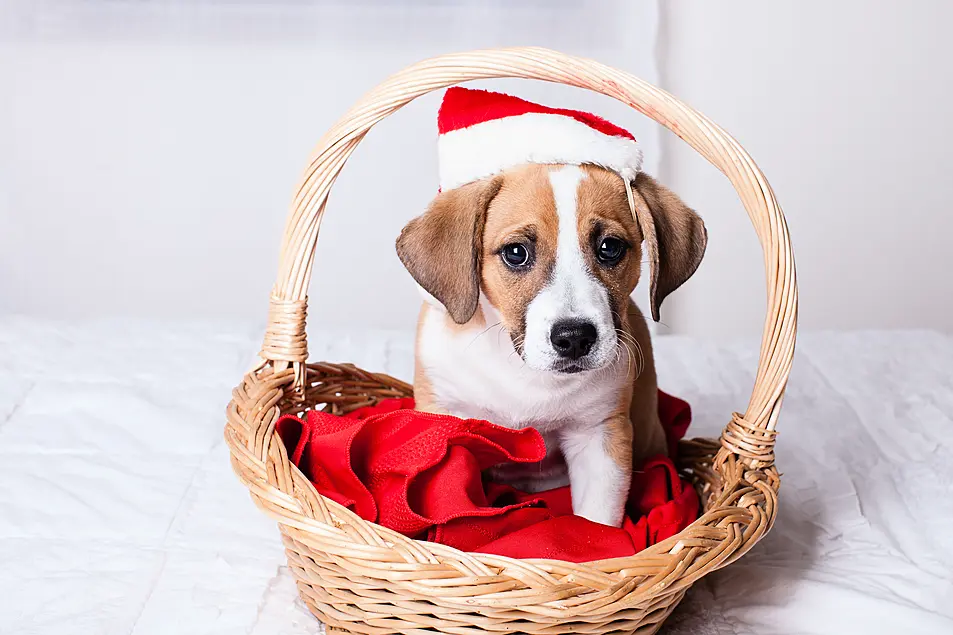We’ve all heard the message ‘A dog is for life, not just for Christmas’, yet dogs, and particularly cute puppies, are still given as Christmas presents.
As well as the responsibility of taking on a dog being far more onerous than your average present that isn’t living and breathing, a new warning has been issued urging parents to be wary of buying puppies from unlicensed sellers online.
The warning, from the Scottish Crown Office and Scottish SPCA, says organised crime gangs are involved in illegal puppy farming and use huge profits from the sale of pups to help fund gang-related crime, including the distribution of illegal drugs and money laundering.
Kenny Donnelly from the Crown Office and Procurator Fiscal Service, says: “We know that many parents may be considering buying a puppy for their children at this time of year as a Christmas present.
“We would urge people to carry out proper research and only purchase puppies from authorised breeders. Organised crime gangs continue to spread their malign influence into illegal puppy farming and use the huge profits they accrue from it to inflict widespread harm on communities.”
Dr Samantha Gaines, head of the RSPCA companion animals department, says: “Pets can be an amazing addition to our lives, but we’d never advise anyone to buy an animal for someone else as a gift.
“Taking on an animal should be really carefully considered by the person who is going to be responsible for them, so they can be absolutely certain they’re going to be able to provide that animal with the time, knowledge and finances to look after him or her.”
And Claire Wilson-Leary, public affairs manager at the Dogs Trust, points out that while the Dogs Trust 1978 strapline ‘A dog is for life, not just for Christmas’ has helped lead to a huge reduction in the number of puppies handed over in January, the past three years have been some of the busiest on record for the charity, with a consistently high number of people wanting to give their dogs up for adoption.
Here’s what you need to consider before getting a puppy at Christmas – or at any other time of year…
1. Do you have the time?
The Dogs Trust warns dogs shouldn’t be left home alone for hours at a time, as not only will they need to go to the toilet, but they’re social animals that need company. So can you be at home with them during the day, or, if not, can you arrange for a dog walker to help, or send your puppy to doggy day care?
“As well as having the time to be at home for your pup, you also need to be able to dedicate some time to training and games,” says Wilson-Leary. “Dogs need lots of mental stimulation and love to learn. Likewise, you need to have time to exercise them every day, too.”

2. Can you afford it?
As well as the initial outlay of buying a puppy – some breeds can cost up to £3,000 – Gaines says there are many other expenses to bear in mind. “There’s a huge amount to consider, from whether you have the time to dedicate to a pet, to the associated costs such as food, pet insurance, toys and bedding, grooming costs, vaccinations, parasite treatment, kennel or dog-sitting costs and much more.”
3. Be careful where you buy from
Although children’s reactions when they see their new puppy on Christmas Day can be fantastic, parents should think about the pup’s welfare rather than just their child’s joy.
“The first time you meet your potential new puppy is such an exciting moment,”says Wilson-Leary. “Unfortunately, though, excitement often means people can forget to ask important questions which can help to establish that the breeder is trustworthy, and that the puppy is in good health.”
Think about adopting a rescue dog, but if you decide you want to buy privately, check the Kennel Club’s Assured Breeder scheme.
Wilson-Leary says key things to look out for are ensuring you can meet the puppy with their mother, that their environment is clean and safe, if the dogs look happy and healthy and you’ve checked their vaccination and microchip details.
“You should never be offered to have the puppy delivered to you or asked for a deposit before you’ve met the puppy,” she says. “It’s important to not feel pressured to make a snap decision, and walk away if something doesn’t feel right.”

4. Christmas may not be the best time to get a puppy
Although you may be desperate to see the look on your child’s face when they see their puppy, bear in mind that the chaos of Christmas may make your home really scary for a young pup.
Gaines says: “Christmas, in particular, can be a busy and hectic time for many households. Unusual noise, activities and extra demands upon the household can make it difficult for any pet to settle into their new home, so it’s not always the best time to introduce them into the household.”
However, she points out that for some people the festive period is a calm, quiet time and if that is the case, suggests: “It may well be a good opportunity to introduce an animal into the home, as families tend to be around the house with more time to spend with them, and we would urge them to consider adopting.”
5. Are you prepared to make the effort?
A puppy may look cute, but it will also do lots of not-so-cute things like go to the toilet in the house until it’s toilet-trained, bark, potentially chew your things, run away when off the lead, need walking in the cold and rain, and so on.
Wilson-Leary stresses: “From house training to getting them used to spending time alone, dogs need someone who will give them the time and support required to learn these skills.”
6. Can you commit long-term?
Don’t just think about your life now – a dog could live as long as 15 years, so be sure the animal will fit into your plans. Do you want to travel, for example – what will you do with your dog then?
“By doing your best to ensure that it’s highly likely you’ll be able to commit to dog ownership long-term, you’ll reduce the chances of having to re-home your dog in the future,” Wilson-Leary points out.







